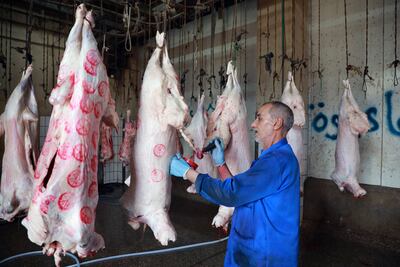The slaughtering of animals on the streets of Cairo for Eid Al Adha has been banned this year.
Millions of Egyptians are accustomed to slaughtering sheep in their neighbourhoods each year, seeing the bloodletting as a means of blessing the area during the four-day religious festival.
Sacrificing an animal is a central part of Eid Al Adha, one of Islam’s holiest festivals. The meat is distributed to the less fortunate as an act of charity.
However, this year, a fine of up to 10,000 Egyptian pounds ($640) will be imposed on anyone caught slaughtering animals in public, according to a statement from Cairo Governor Maj Gen Khaled Abdel Aal.
All animal sacrifices must be performed at one of the government’s sanctioned slaughterhouses. These will be free for the public to use.
The ban will end unofficial and slaughter that does not meet health and sanitation standards and preserve the environment, Maj Gen Abdel Aal said.
He said that no one, whether they are a member of the public or a butcher, should make a public display of the slaughter - another Egyptian Eid custom - especially if they are doing so on main roads.
State-owned slaughterhouses will operate around the clock during Eid Al Adha this year, the governor said, adding that there is no reason for people not to follow the rules.

In addition to the 10,000-pound fine, Maj Gen Abdel Aal announced a prison sentence of up to a year for those breaking the law, which is now part of the country's environmental legislation.
Fines for repeat offenders will multiply according to how many breaches they commit.
The Cairo authorities are also on standby to remove any animal remains dumped in the streets after unlawful slaughter.
Carcasses are often left to rot in the weeks following Eid Al Adha, creating a major health hazard.


